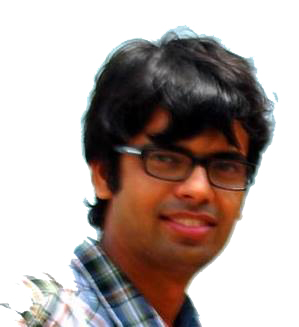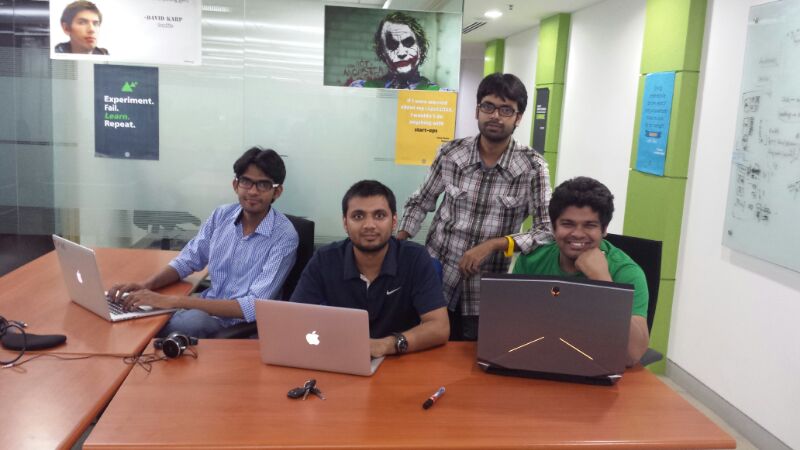Interview with Angam Parashar, Co-Founder - ParallelDots
After graduating from IIT Kharagpur, Angam Parashar worked as a Business associate for Ecozen Solutions and later at Opera Solutions. The startup bug that had hit him in his college led him to begin his own company called - ParallelDots with his co-founders.
In an exclusive interview with CrazyEngineers, Angam shares the story behind their company's name, importance of the right team for any startup and more. Read on!

1. Could you please tell the readers more about ParallelDots and how it helps to solve the problem of Information Overload?
Angam: Of course. ParallelDots is a start-up of IIT Kharagpur and BITS Pilani graduates and is backed by Times Internet Limited. We allow any content archive to be presented in a story using advanced techniques of NLP and machine learning. For publishers and bloggers, it automatically creates timeline of any event using their archive and present it in an interactive, intuitive and easy-to-navigate interface on their webpage itself.
With so much data being generated on a daily basis on Internet, users have already started facing issues of information overload. It often gets difficult to keep track of any event and how it has evolved over years. Wikipedia and Google solve this problem to some extent, but to be unfairly fair – they are the reasons why this problem exists. We know that information we look for is somewhere there, just that it is lost in time among millions of web pages. In the end we also manage to find it, but not until we have spent countless hours on internet. ParallelDots simplifies the process of keeping track of any event as it happened, by automatically generating timelines for that event.
2. What are the various services delivered by ParallelDots?
Angam: We are a B2B company. We work with the online publishers (online news portals/blogs) and help them derive value from their archive. We’ve made a simple widget that gets embedded just below the article on the webpage of any publisher. It contextually recommends relevant articles from their archive such that it forms a timeline around the theme of the article. Publishers benefits from our widget by providing their end-users with better user experience, which in turn results in higher user retention rate, and higher average time spend per user on their website.
3. What inspired you to become an entrepreneur? How did you come up with the idea of ParallelDots?
Angam: Right from my first year, I was friends with all the people from Entrepreneurship Cell of IIT Kharagpur. During my third year, I got a chance to work for Ecozen Solutions, a startup in energy sector. I continued working for Ecozen for the next two years, which gave me a lot of exposure to startup culture. Later, after my graduation, I decided to take a full-time job as a management consultant at Opera Solutions to explore other dimensions. Here I familiarized myself with terms like Big Data, Machine Learning, etc. Already bitten by startup bug, I finally decided to go full throttle this time.
Meanwhile, my other co-founder Ankit (who was also the part of E-cell IIT Kharagpur) was also planning to return from Australia to try something new. He ended up staying at my place for few days. While in Australia, he had completely lost touch with the news of Indian politics.
He started Googling and spent hours trying to get back on track. It was then that the idea struck me. May be we could make tracking an event little easier than what it is today. And so ParallelDots was born.4. ParallelDots is founded by a team of three (Ankit Shah, Muktabh Mayank and you). How did the team get together?
Angam: I, and Ankit have been close friends right from my first year at IIT Kharagpur. We shared the same wing in the hostel as well as belonged to the same department. I met Muktabh, who is a graduate of BITS Pilani, while working at Opera and we quickly became great friends. And during one of the visits of Ankit to India, I introduced him to Muktabh. Well, that’s how we all met.
One thing common among three of us was the passion towards entrepreneurship. And luckily all three of us possessed different and complimentary set of skills necessary for a tech startup. I decided to take on the business role. Muktabh, being a machine learning expert, takes care of the core technology behind ParallelDots, and Ankit, who is a self-taught programmer, takes the responsibility of front-end development, while often acting as a bridge between technology and business.

5. You have completed your B.Tech and M.Tech from IIT Kharagpur. What are your views on the importance of education for any entrepreneur? What were the major technical challenges ParallelDots had to face? How did you make your way past them?
Angam: Education of course is the most important thing for an entrepreneur today. A strong educational pedigree has it rewards, but it doesn’t guarantee success. Factors that guarantee your success are abstract, but more important nonetheless.
What matters in the long run is how passionate you are about your idea, how much you believe in it, and how well you execute it.The biggest challenge for any startup is to form the right team. Pretty much all the challenges could be overcome when solved by the right people. At ParallelDots, we extensively deal with tough technical problems in text analytics, NLP, and Machine Learning. In Muktabh and Ankit, we have two fantastic coders. In addition to them, we have great interns who are always ready to take any problem heads-on. What we have realized that you will always find workarounds around technical problems. It’s the business aspect that wreaks havoc for a startup.
Figuring out the right business model, and marketing & sales strategy to eventually build a sustainable business often turns out to be much bigger challenge than anything else. You not only need to be really great with your people skills, but also need right mentors who can guide you at various steps.6. You have experience of working with various companies like Opera Solutions and Ecozen Solutions. How important according to you is prior experience for any entrepreneur?
Angam: I was associated with Ecozen during last two years of my college. While working there I learned a lot about working the startup. Having already worked with MNCs during my interns, I realized that working in a small team gives a much better learning curve than working in MNCs. During my job at Opera, I learned a lot about Big Data analytics, and Machine Learning - what all we can do with them, what are their applications, etc. ParallelDots for me is the combination of all my learning at Ecozen and Opera put together.
I think experience is overrated, unless you are working in the sector in which you plan to startup. The moment you have an idea you firmly believe, form a right team and just start. Don’t wait to get experience. Jobs don’t prepare you or help you become a successful entrepreneur.7. Why did you name your startup "ParallelDots"?
Angam: That’s a funny story. We spent three days continuously to find a right name, but with no success. On fourth day, during one of our day-dreaming sessions, Ankit rephrased the famous Steve Jobs quote, “Once we are billion dollar company, we will have a good laugh connecting the dots on this name thing.”. It was then my brother, Deepak, said, “That’s what we are essentially doing, we are connecting parallel dots - creating timelines, linking different events, blah blah…”; and there it was. And by god’s grace dot com domain was actually available.
8. What are the biggest lessons you have learned from your varied experiences? What will be your advice to wannabe entrepreneurs?
Angam:
It’s never about the idea; it’s always about the team. A great team can make even a poor idea work.As I said earlier, if you have an idea you are really passionate about, get the right people onboard and start. Don’t wait for anything.
9. Thank you for your time. Any message for our readers?
Angam: Thanks for the opportunity. It’s been a pleasure.
Don’t do the startup for the sake of doing it. Ensure that you are doing it for the right reason. It is equally true for the people who are working with you, be it your co-founders, be it your employees. Ensure that they believe in the idea. Keep your family close. It is your family and your team that’s gonna stick with you when things aren’t working. They are invaluable.
